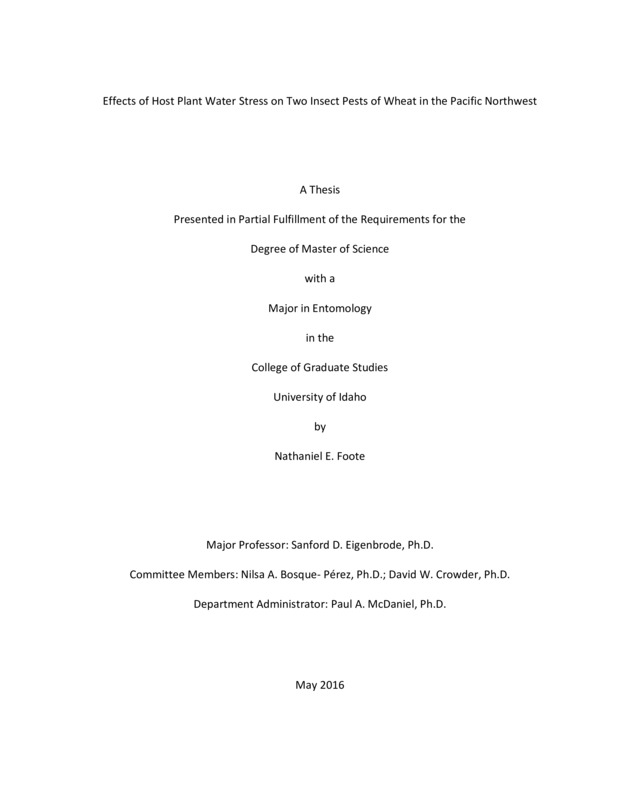Effects of Host Plant Water Stress on Two Insect Pests of Wheat in the Pacific Northwest
Foote, Nathaniel Edward. (2016). Effects of Host Plant Water Stress on Two Insect Pests of Wheat in the Pacific Northwest. Theses and Dissertations Collection, University of Idaho Library Digital Collections. https://www.lib.uidaho.edu/digital/etd/items/foote_idaho_0089n_10801.html
- Title:
- Effects of Host Plant Water Stress on Two Insect Pests of Wheat in the Pacific Northwest
- Author:
- Foote, Nathaniel Edward
- Date:
- 2016
- Embargo Remove Date:
- 2017-01-08
- Keywords:
- agriculture climate change drought insect pests wheat
- Program:
- Plant, Soil and Entomological Sciences
- Subject Category:
- Entomology; Agriculture; Climate change
- Abstract:
-
Continued or accelerated warming of global atmospheric temperatures are expected to alter rainfall patterns, raise global aridity, and increase the frequency and severity of extreme weather events, including floods, heat waves and droughts. In the United States the frequency and severity of droughts have increased significantly over the past several decades, and global climate model analyses anticipate greater risk of drought on most continents during this century mainly as the result of elevated global mean surface temperatures and increasing aridity.
In cereals, which are the dominant staple crop worldwide, drought continues to be the main abiotic constraint on crop productivity and yield, and in severe cases leads to crop failure. However, impacts from drought can also emerge from its effects on other biotic components of the cropping system. Insect herbivores that are pests of cereals are important in this respect because in addition to damaging crops directly, drought-induced changes to the host plant or its growing conditions can affect the net impact of certain pests. But pest responses to drought can vary in direction and magnitude between species of an herbivore community as well as the level (i.e., severity or duration) of drought stress. For these reasons especially, the effects of drought on cereal pests and herbivores in general remain poorly understood.
Cereal systems in the Pacific Northwest (PNW) region of the United States contribute significantly to the global wheat crop. Economically important pests of cereals in the PNW include the cereal leaf beetle (CLB), Oulema melanopus and multiple cereal aphid species, including the bird cherry-oat aphid, Rhopalosiphum padi and more recently, the grass aphid Metopolophium festucae cerealium. Cereal leaf beetle and both aphid species can cause extensive damage to a variety of cereal crops, but are highly prevalent in wheat grown in the PNW. Research and monitoring efforts have improved our basic biological understanding and control of these pests considerably. However, information detailing responses by these pests to drought stress largely remains limited to mixed findings that can be difficult to interpret or apply within a broader management context.
We tested the effects of plant water stress on the feeding performance of CLB and growth of its host plant, using a study system in wheat (Triticum aestivum) and greenhouse experiments. Experimental watering regimes, which provisioned either ample or deficient water supplies at regular intervals, produced healthy and chronically water-stressed potted wheat plants, respectively. We found that water stress may adversely affect CLB performance and significantly impacts the growth and seed production of potted wheat. However, results from these experiments show that there were no significant interactions between water stress and CLB feeding damage on wheat growth or seed production, suggesting that the combined negative effects from these two stressors on the host plant are additive.
We additionally tested the hypothesis that plant water stress mediates interactions between the cereal aphids M. festucae cerealium and R. padi, again using greenhouse experiments with potted wheat plants grown under experimental watering regimes. We found that experimentally induced water stress resulted in significantly smaller wheat plants, and negatively affected R. padi but not M. festucae cerealium on host plants colonized by only one or the other species. However, M. festucae cerealium was negatively affected on plants simultaneously co-colonized by R. padi, and an interaction occurred whereby this effect was significantly greater on the water-stressed plants. Additionally, we found that higher reproduction rates occurred for R. padi feeding in close proximity to, or on leaves previously infested by M. festucae cerealium on wheat plants that were provided an ample water supply. Our findings suggest that interactions between these two economically important aphid species are ecologically complex, producing asymmetrical competitive outcomes which can depend greatly on the environmental context under which these interactions take place.
This thesis aims to provide better understanding of the biotic constraints on cereal systems in the Inland PNW by investigating the effects of plant water stress on these regionally prevalent pests, using a study system in wheat and greenhouse experiments. Potential implications for pest management in PNW cereal systems under projected climate scenarios will be discussed using a regional context relevant to agriculture globally.
- Description:
- masters, M.S., Plant, Soil and Entomological Sciences -- University of Idaho - College of Graduate Studies, 2016
- Major Professor:
- Eigenbrode, Sanford D
- Committee:
- Bosque-Pérez, Nilsa A; Crowder, David W
- Defense Date:
- 2016
- Identifier:
- Foote_idaho_0089N_10801
- Type:
- Text
- Format Original:
- Format:
- application/pdf
- Rights:
- In Copyright - Educational Use Permitted. For more information, please contact University of Idaho Library Special Collections and Archives Department at libspec@uidaho.edu.
- Standardized Rights:
- http://rightsstatements.org/vocab/InC-EDU/1.0/

